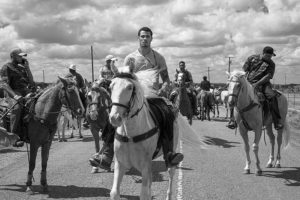Southwest Louisiana’s Creole Trail Riding Clubs
By Alexandra Giancarlo
Photos by Jeremiah Ariaz

You could say trail riding and horse culture is in Acynthia Villery’s blood. “I was going to rodeos in my mother’s womb,” she explained to me. A Texas transplant, Acynthia hails from a long line of Creoles in south Louisiana. Her heritage has such mixed origins that, when asked about her background, she jokes that she’s “a Heinz 57,” referring to the alleged fifty-seven varieties of the famed sauce.
Trail riding—recreational horseback rides featuring anywhere from a few dozen to thousands of participants, held on a weekly basis by a rotation of dozens of trail riding clubs—occurs throughout southeast Texas and southwest Louisiana, even spreading into Mississippi in recent years. Despite the practice’s present-day geographic breadth, it is most closely associated with the Creoles of rural Southwestern Louisiana who descended from some of the region’s earliest settlers, many of them landowning gens de couleur libres (free people of color) in antebellum times. Others were enslaved and played a crucial role on the farm and the ranch. All had multiracial origins, owing to the multi-generational mixing of people of European (usually French), Native American, and African ancestry.
Read the full story at KnowLouisiana.com
To learn more about Creole culture, check out this field trip:
Zydeco, Gumbo, and Black Innovators: A Day Trip to Southwestern Louisiana Creole Country
This field trip is a day trip to the southwestern part of Louisiana, home to the mixed-race French heritage Creoles. In collaboration with community members, we will be treated to a traditional Creole lunch and listen to a private music demo by renowned zydeco artist Keith Frank (and have a Q&A with the artist). The Black History Month exhibit at Opelousas Museum (“African American Business Owners and Innovators”) has been extended to accommodate our group and the exhibit’s curator, a Creole community historian, will be guiding our tour. Over the course of the day, we will learn about Creoles’ little-acknowledged history—such as Creole cowboys, predating much of the white settlement of the area—and their often-obscured contributions to the region’s cultural offerings. En route, we will watch a classic documentary film on Creole lifeways by ethnomusicologist Nicholas Spitzer (Tulane) to set the scene.
To sign up for this trip, login on the Registration page, then find field trip F2_3.

